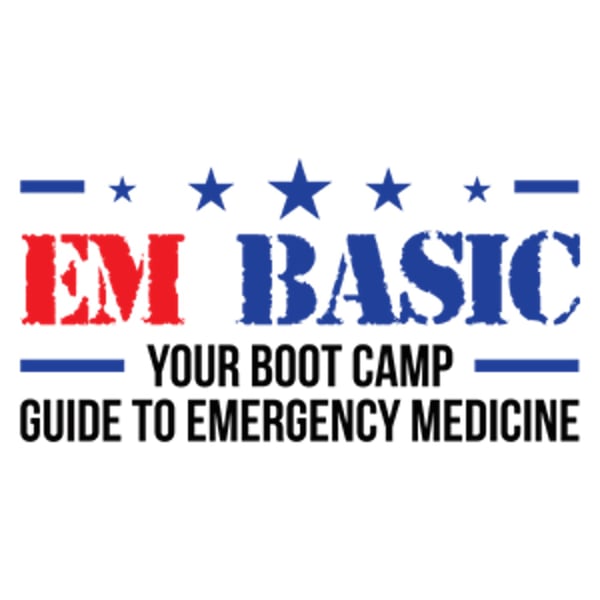Hyponatremia
EM Basic
EM Basic LLC
4.6 • 665 Ratings
🗓️ 13 August 2012
⏱️ 22 minutes
🧾️ Download transcript
Summary
Hyponatremia (low serum sodium) is one of the most common electrolyte disorders encountered in the ED. Most of the time this electrolyte disorder requires us to do less- not more. However, if the patient is critically ill from their hyponatremia then we need to know how to quickly intervene and even be a little creative if we don't have the medications that we want. We'll review how to do the right thing for these patients, track down the cause of hyponatremia, and make the right decisions so we don't cause any harm.
Transcript
Click on a timestamp to play from that location
| 0:00.0 | Hey everybody, this is Steve Carroll, and you're listening to the Amb Basic podcast. |
| 0:05.5 | Today we're doing a topic that has been suggested by a few listeners, an episode on electrolytes. |
| 0:11.3 | In order to make this relevant to the ED, today we'll talk about one of the two most common |
| 0:16.5 | electrolyte disorders that we see in the ED, hyponetremia. |
| 0:20.6 | In the next episode, we'll talk about |
| 0:22.3 | hyperculemia, probably the second most common electrolyte disorder that we see. The management of |
| 0:28.0 | hyponotremia and hyperclemia can be confusing because everyone has a different opinion on how to |
| 0:33.2 | manage it. So today, I'll talk about my views on managing hyponetremia, and the next episode |
| 0:39.1 | will be about hyperculemia. As always, his podcast doesn't represent the views or opinions |
| 0:43.3 | the Department of Defense, the U.S. Army, or the Fort Hood Post Command. First, let's talk |
| 0:47.9 | about hyponetremia. Here's the one thing that you have to keep in mind about hyponetremia. |
| 0:53.7 | As long as the patient is in the |
| 0:55.1 | ED, the best thing to do about it is nothing at all. Well, maybe not nothing. Let's say that |
| 1:01.4 | the best thing to do is to not try to correct it. The only time we would be looking to actively |
| 1:06.6 | correct someone's sodium level in the ED is if they're actively seizing due to a low sodium |
| 1:12.0 | or if they're really altered, and we know that the patient's sodium is the most likely cause of it. |
| 1:18.4 | Other than those two situations, the best thing to do about hyponotremia in the ED is nothing at all. |
| 1:24.5 | The reason why I'm stressing this point so early is because you can get into some |
| 1:29.0 | real trouble if you start trying to fix lab values and lose sight of the patient's clinical situation. |
| 1:34.5 | Let's back up a bit and talk about the usual situation in the ED where the patient is stable |
| 1:39.7 | and doing fine. Then we'll talk about all the funny and exciting critical care related to severe hyponetremia. |
| 1:46.7 | Hyponotremia can present in a variety of ways. |
... |
Please login to see the full transcript.
Disclaimer: The podcast and artwork embedded on this page are from EM Basic LLC, and are the property of its owner and not affiliated with or endorsed by Tapesearch.
Generated transcripts are the property of EM Basic LLC and are distributed freely under the Fair Use doctrine. Transcripts generated by Tapesearch are not guaranteed to be accurate.
Copyright © Tapesearch 2025.

